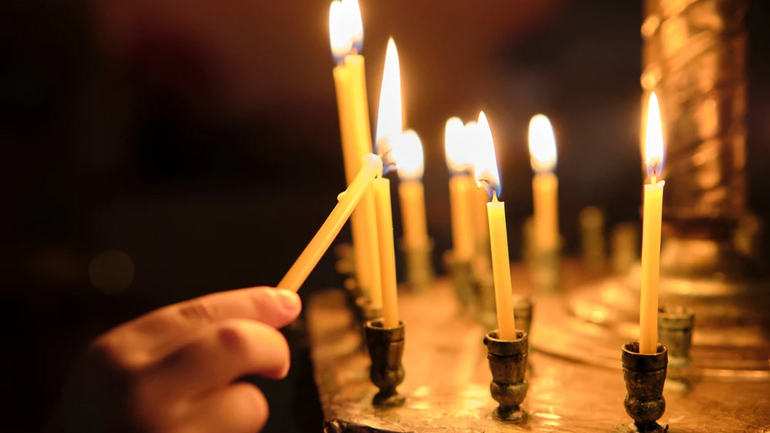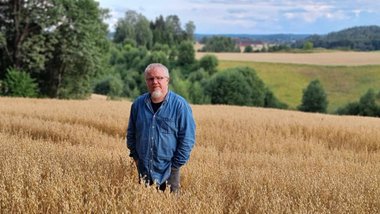Triduum in Ukraine: 'God will be where I will be'

Easter will come two months after Russian forces began their invasion into Ukrainian territory.
Churches of the Byzantine tradition reflect on Holy Thursday upon 12 passages from the Gospels, which depict the suffering and death of Christ. They are read aloud, liturgically, between 5:00 and 9:00 pm.
During those sacred hours this year, Ukrainians across the country were ordered twice to seek refuge in bomb shelters, as air raid signals overheard blared out warning sounds.
It is likely that during the rest of the Paschal Triduum, Ukrainians will go down to the bomb shelters several more times.
“During the special service dedicated to the Christ’s Passion, where we read the Gospel story of His suffering, for the second time, the whole of Ukraine is covered with airstrike alarm,” Maksym Tymo, cantor and liturgist of St. Sophia Church of Lviv, wrote on his Facebook page Thursday evening.
“Our enemy continues to unfold his sinister symbolism,” he added.
Even as Christians of the Eastern rite, both in Ukraine and in Russia, are approaching the culmination of the Church year - the feast of the Resurrection of Christ - the war in Ukraine does not stop. In the east, it is become more violent.
But as Easter approached, UN Secretary-General Antonio Guterres; His Beatitude Sviatoslav, head of the Ukrainian Greek Catholic Church; Pope Francis; and Rev. Ioan Sauca, acting secretary-general of the World Council of Churches, called for a ceasefire.
For his part, Patriarch Kirill of Moscow remained silent. Russian political leadership rejected the idea of an Easter cease-fire.
Still, planned services have not been canceled in most of Ukraine, so Greek Catholics and Orthodox are preparing to celebrate Easter, despite the circumstances.
Fr. Ihor Shaban, a Ukrainian Greek Catholic priest from Boryspil near Kyiv, told The Pillar that strict limits have been imposed on public gatherings in part of the Kyiv region, because of the war’s danger.
The city’s mayor recommended that Easter liturgies not take place — but they will be held, even if not on the same scale as in previous years.
Shaban told The Pillar that most of his parishioners have left and have not yet returned, but new people are coming to the parish, he said.
“Even the faithful of the Ukrainian Orthodox Church of the Moscow Patriarchate are coming. All people come confused; they have many questions. And if no one will comfort them, where will they go? It can be difficult; I have served at several funerals recently. It is difficult to speak, banal answers do not console people, so I have to be sensitive and look for the right words,” the priest said.
There is, several priests told The Pillar, deep confusion among Ukrainians.
Usually in Ukraine, the last week before Easter combines sadness and joy, as sad themes of suffering are combined with a foretaste of a joyful Paschal Matins liturgy.
But this year things are different.
Maksym Tymo told The Pillar that he felt spiritually exhausted during Lent.
“I could not understand the logic of the Byzantine liturgical texts that guide us during Lent. All the drama of these texts, which I know very well and have been trying to explain to people for many years, was completely foreign to me. I could not immerse into them; I do not have such a bright premonition that I always had in this period.”
“But the Resurrection is, for me, an object of Christian hope. It is ahead, although I do not see it yet."
Tymo is not the only Ukrainian with a sense of hope as Easter approaches.
On the 58th day of the war, some Ukrainians told The Pillar they can attest that God did not withdraw himself, and their personal experience helped them rethink their faith even more deeply.
Sofia Kochmar-Tymoshenko told The Pillar that her Holy Week began on February 24, the night that Russia started its invasion of her country..
A local producer for the BBC World News in Ukraine, Sofia recalled that her colleagues had warned her in February that the war would start soon, so she had taken her three-year-old daughter out of Kyiv in advance, and she planned to keep working.
But when the bombing started, “my husband was in Poland on the same day. He decided not to return, but to wait and see if we could evacuate.”
Sofia felt alone.
“At that moment,” she recalled — in a war zone, and responsible for her daughter — “I felt what Jesus must have felt when all the disciples ran away, and he went to Calvary alone”
“I stayed in Kyivl, worked in a bulletproof vest and helmet, and spent nights in the basement. At the moment, I did not understand why my husband had done this to me.”
“But at some point, my colleagues realized that I could not work effectively in that state and they advised me to go abroad with the child.”
Sofia said she did not want to be a refugee, and it wasn’t easy. But she thought about pilgrimages she had made.
“The experience of pilgrimages helped me because sometimes there was no place to spend the night, and we somehow stopped where we could. But God sent me very good people.”
Eventually Sofia ended up in Italy, where she was able to be reunited with her husband. But there were things to resolve between them.
“When we settled down a bit and I realized that my child was safe, I realized that I had to do something with my heart. And I asked for a weekly retreat to the Jesuits in Genoa and stayed there in silence for a whole week.”
“In those days, I realized that there was a God beside me, who died for me.”
“When I left the retreat house, I told myself that I would do nothing, letting Jesus act if it mattered to him. And after that, my husband and I talked for two days, and finally we rebuilt our ‘domestic Church,’” she said.
Sofia has returned to Kyiv, and says will continue working while her husband and child remain in Italy.
She is working now on a story about people who survived the horrors in Bucha: “It so happened that I will work on the day when there will be Easter services. This is the first time in my life that I won't be at these services, but I am sure that God will be where I will be at that moment,” she told The Pillar.
The morning that Holy Week began in Ukraine, it started with a missile strike in Lviv.
Fr. Yuriy Shchurko, dean of the theological faculty of the Ukrainian Catholic University, told The Pillar that he had not yet gone down to a bomb shelter with his wife and children when he saw a missile flying in the sky, and then heard explosions.
"At such moments you feel how real it all is. Yes, it didn't fall in my yard. But many people in Ukraine today live under constant shelling, sitting in basements, and explosions are constantly heard over their heads,” he said.
“This is horror on the verge of surrealism. All this shows that evil is not an abstraction; it is real, disgusting, and scary."
Indeed, for the Christians in Ukraine, the biblical texts about the sufferings of Christ — which they hear every year, and which in peacetime might be perceived as abstract — resonate this year directly with the reality around them.
Eastern iconography of the passion is less realistic than western art; it does not contain images of the agony of Christ and his mutilated dead body. But as believers in Ukraine reflect on that iconography, they also actual footage of murdered and killed compatriots in the daily news.
“These days we are singing Psalm 87,” where there are such words as “You have put me in the depths of the pit, in the dark and deep regions,” Maksym Tymo told The Pillar, “and I immediately remember that many our people are now in the dungeons. Alive people who suffer without food and water, hiding from the bombing.”
Hieromonk Luka Mykhailovych of Lviv, told The Pillar that he too sees parallels between his country’s suffering, and the passion of Jesus Christ.
For Mykhailovych, the 12 passages read liturgically about the passion of Christ reflect what is happening in Ukraine.
“Jesus became a victim of human malice, deceit, betrayal, indifference, blasphemy, political manipulation. He was convicted quite illegally. And there were many people around who watched the horrible spectacle of lawlessness and said nothing.”
“Something similar is happening to my country today,” the priest said.
Fr. Shchurko said he is reminded this Holy Week that “Christ continues to suffer in the human race, and has suffered every year.”
“While we had peace here in Ukraine, we did not hear the pain and wailing in Africa, North Korea, or other totalitarian systems. Many people have become accustomed to seeing the passions of Christ as remote in time, and preachers have had to look for parallels in history to explain them to people better.”
“And now they have become our history.”
Schurko runs “Living by the Word,” a website at which he presents thoughts on the Church’s daily readings. But the priest decided that this year during Holy Week, he would write nothing.
He said that the Word of God is self-sufficient, especially in Ukraine’s circumstances: “You should not overshadow the gospel with your ignorance, unnecessary words hurt.”
Fr. Mykhailovych also spoke with the The Pillar about hope. He emphasized the need for Ukrainians to find solidarity in difficult times.
“As the Ecclesiastes says, ‘Two are better than one’... if our religiosity does not open horizons of hope, then it is meaningless. Sociologists say that most people who come to church consciously or not seek a sense of security. Many environments to which Ukrainians belong do not give such a feeling. Therefore, they seek a church community, which they see as an environment of trust,” the priest said.
“And vibrant trust breeds hope. Trust that God is nearby. He did not withdraw himself. He descends into the dungeon of our Ukrainian sheol.”









